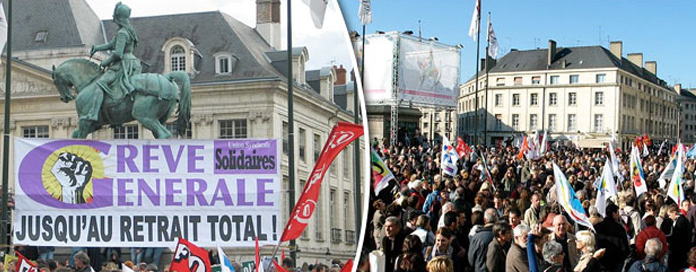The Geography of the Euro
Having your own currency has always been an important feature of national identity so when 11 countries started to share a common monetary system in 1999 it was a huge step towards 'European Unification' - that is, making Europe into one large political and economic unit.
The Geography of the Euro is more complicated than you might think!
Use the map to see why!
So What's happening?
The situation is complicated but basically it's all about the changes in the global patterns of development and the effects of the centuries old core/ periphery pattern in Europe of poor countries around the edges and rich countries in the centre.

Strikes in Europe
-
Nations like China, India and Brazilwhich Geographers call NICs (newly industrialised countries) are growing so quickly that they are out-competing many of the countries that the textbooks call 'MEDCs' selling much more to them than they buy from them.
-
MEDC industries are just not earning enough money and have run up huge debts. However the countries still expect to have a high standard of living and spend money, often borrowed to keep up the standard.
-
In Europe the central 'core' counties -particularly Germany and France have managed to keep up some of their economic growth, but the poorer (peripheral) counties around the edge of Europe, like Greece, Spain, Italy and Ireland have not grown enough or are in economic decline (recession).
-
For at least the last decade, the peripheral countries have spent far too much on their running costs and borrowed huge amounts of money from international banks and the other countries in the E.U. Their populations has sometimes lived very well on this borrowed money with, for example lots of investment in new roads, well paid jobs and good pensions.
-
Now these countries' industries are in decline, they cannot make the money to pay back the loans or even pay the interest on the loans! This means that, for example, Greece and Italy are thought by the money markets to be too high a risk for providing the further loans they need to prevent them running out of money completely (bankruptcy).
-
The richer Euro Countries that could help them do not want to throw more money away on peripheral countries that should be doing more themselves to get out of these problems. The lack of good leadership by Greek and Italian Governments with insufficient effort being made to cut down on spending, makes Germany and France extremely unhappy and risk tearing the Euro-zone apart. This would lead to a huge Global scale financial crisis.

Greek Debt Crisis
So What are the Options?
-
New governments in the periphery countries pass new , extremely harsh cost cutting laws that convince the big international money lenders that they are safe to lend more money to. The populations of these countries will be very unhappy with the serious unemployment and reductions in their wealth levels and quality of life. There could to be serious civil unrest (strikes, demonstrations, violence) and not all the political parties in those countries will agree with the 'austerity measures' that will be needed.
-
The 21st century exporters, like China, Brazil and Russia, could use their huge savings to lend to the weak Euro countries but they would only do this if there was better political leadership in these countries and if there is a clear likelihood that the loans would be repaid.
-
The other Euro countries could lend money, but they will only do this if the peripheral countries are showing that they are cutting costs and accepting the responsibilities of good long term economic planning.
-
A global financial organisation called the IMF could lend money but again they won't do this unless the countries show they are trying to sort themselves out. This is where the UK would be involved because the IMP gets its money from nations around the World - including the UK.
-
Greece could leave the Euro. This would lead to chaos in Greece and international money markets because all Greek business has been done in the Euro and the value of the new currency would have to be less (a devaluation). This would lead to poverty and many debts would still be even more difficult to pay back.
-
A two-stage Eurozone is created, possibly with different 'Euro values' where the rich countries are able to grow and the poorer ones have policies to save money.
So now you can see why it is such a difficult problem. The trouble is it affects every one of us because we all have and use money and if the value of it goes down, we all lose out.
You need to keep up to date with this story - it will have much more affect on you than most other - more interesting geographical news items!


